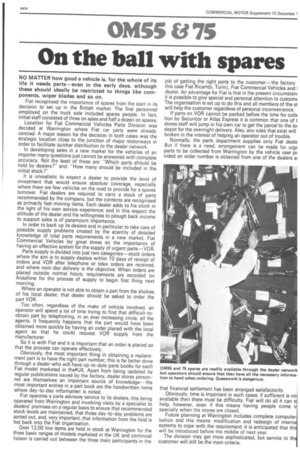On the ball with spares
Page 72

If you've noticed an error in this article please click here to report it so we can fix it.
NO MATTER how good a vehicle is, for the whole of its life it needs parts—even in the early days, although these should ideally be restricted to things like components, wiper blades and so on.
Fiat recognised the importance of spares from the start in its decision to set up in the British market. The first personnel employed on the truck side included spares people. In fact, initial staff consisted of three on sales and half a dozen on spares.
Location for Fiat Commercial Vehicles Parts Division was decided at Warrington where Fiat car parts were already centred. A major reason for the decision in both cases was the strategic location close to the junction of major motorways in order to facilitate quicker distribution to the dealer network.
In developing sales in a new market for the vehicles of an importer many questions just cannot be answered with complete accuracy. Not the least of these are: "Which parts should be held by dealers?" and: "How many should be included in the initial stock ?"
It is unrealistic to expect a dealer to provide the level of investment that would ensure absolute coverage, especially where there are few vehicles on the road to provide for a spares turnover. Fiat dealers are required to carry a stock of parts recommended by the company, but the contents are recognised as primarily fast-moving items. Each dealer adds to his stock in the light of his own service experience; and in this respect the attitude of the dealer and his willingness to plough back income to support sales is of paramount importance.
In order to back up its dealers and in particular to take care of possible supply problems created by the scarcity of detailed knowledge of total parts requirements in a new market, Fiat Commercial Vehicles lay great stress on the importance of having an effective system for the supply of urgent parts—VOR.
Parts supply is divided into just two categories—stock orders where the aim is to supply dealers within 10 days of receipt of orders and VOR after telephone or telex orders are received, and where next-day delivery is the objective. When orders are placed outside normal hours, requirements are recorded on Ansafone for the process of supply to begin first thing next morning.
Where an operator is not able to obtain a part from the shelves of his local dealer, that dealer should be asked to order the part VOR.
Too often, regardless of the make of vehicle involved, an operator will spend a lot of time trying to find that difficult-toobtain part by telephoning, in an ever increasing circle, all the agents. It frequently happens that the part would have been obtained more quickly by having an order placed with the local agent so that he could request VOR supply from the manufacturer.
So it is with Fiat and it is important that an order is placed so that the process can operate effectively.
Obviously, the most important thing in obtaining a replacement part is to have the right part number; this is far better done through a dealer who will have up-to-date parts books for each Fiat model marketed in therUK. Apart from being updated by regular publications issued by the factory, dealer stores personnel are themselves an important source of knowledge— the most important entries in a part book are the handwritten items where day-to-day information is noted.
Fiat operates a parts advisoN service to its dealers, this being operated from Warrington and involving visits by a specialist to dealers' premises on a regular basis to ensure that recommended stock levels are maintained, that those day-to-day problems are sorted out, and, very important, that information from the field is fed back into the Fiat organisation.
Over 12,00 line items are held in stock at Warrington for the three basic ranges of models marketed in the UK and continual liaison is carried out between the three main participants in the
job of getting the right parts to the customer—the factory this case Fiat Ricambi, Turin), Fiat Commercial Vehicles and 1 dealer. An advantage for Fiat is that in the present circumstanc it is possible to give special and personal attention to CLISTME The organisation is set up to do this and all members of the st will help the customer regardless of personal inconvenience.
If parts on VOR cannot be packed before the time for collE tion by Securicor or Atlas Express it is common that one of t stores staff will jump in his own car to get the parcel to the ID depot for the overnight delivery. Also, any rules that exist will broken in the interest of helping an operator out of trouble.
Normally, the parts department supplies only Fiat deale But if there is a need, arrangement can be made for urgE parts to be collected from Warrington by the vehicle user pr vided an order number is obtained from one of the dealers al that financial settlement has been arranged satisfactorily.
Obviously, time is important in such cases; if sufficient is no. available then there must be difficulty. Fiat will do all it can tc help, however, even if this means having people come ir specially when the stores are closed.
Future planning at Warrington includes complete computer, isation and this means modification and redesign of internal systems to cope with the requirement; it is anticipated that thit will be introduced before the middle of next year.
The division may get more sophisticated, but service to the customer will still be the main criteria.
























































































































